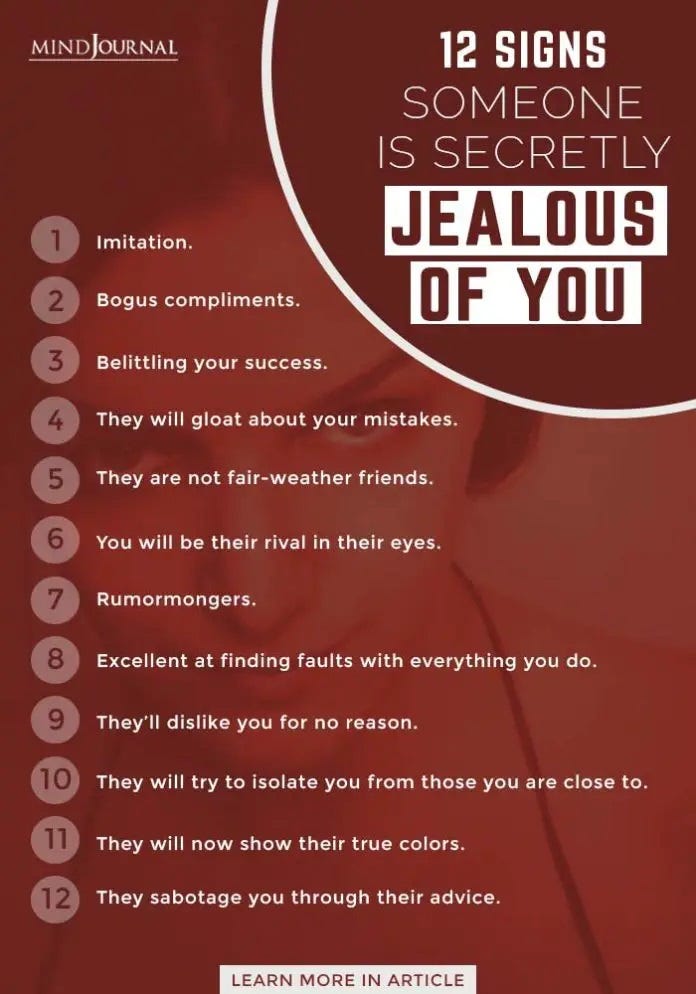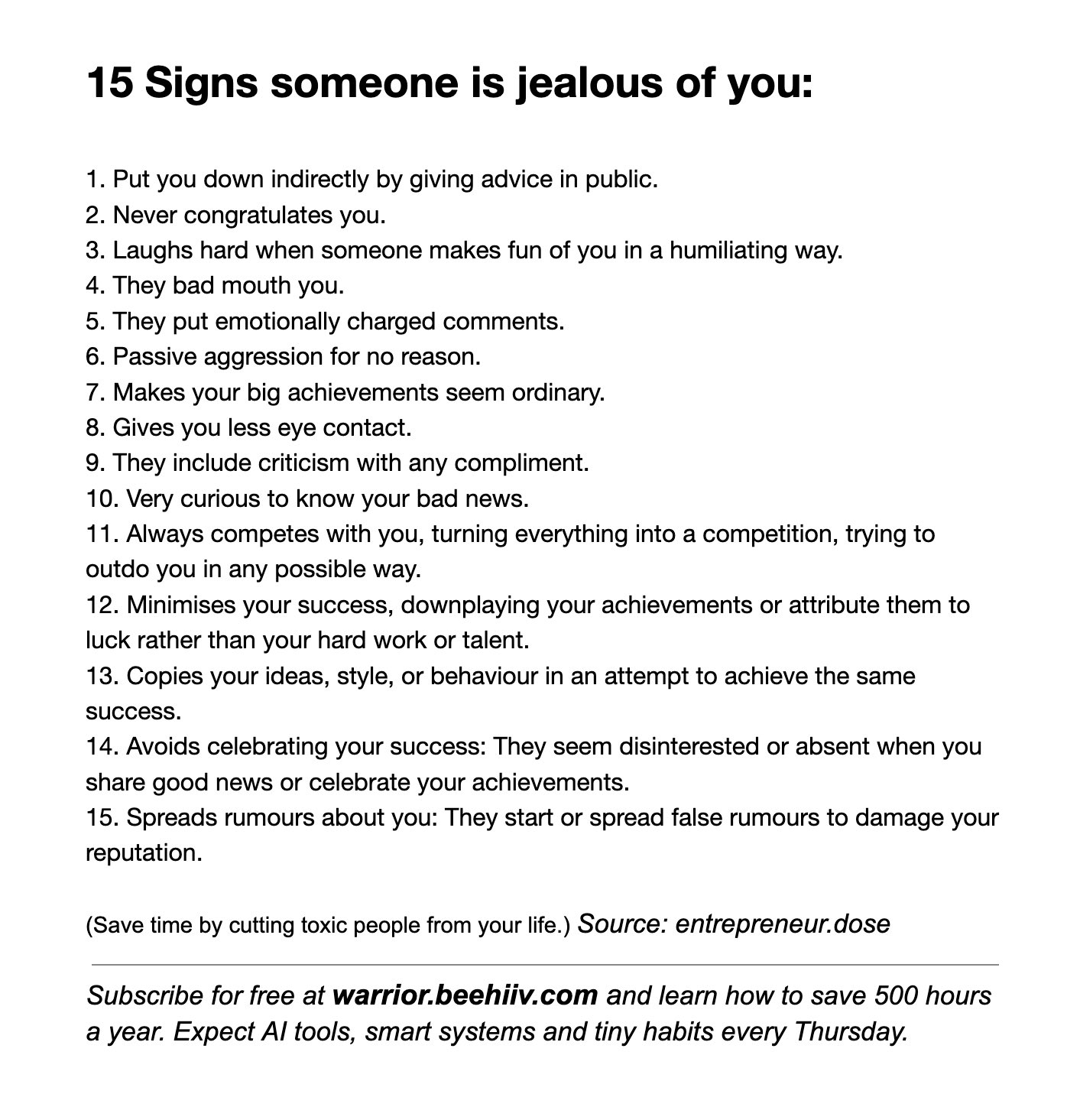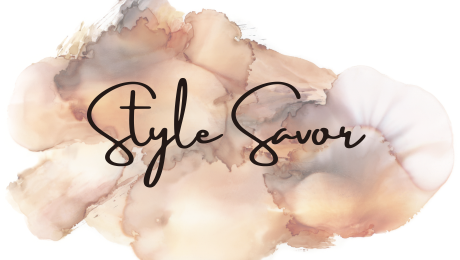Have you ever felt an odd vibe when walking into a room, as if someone’s eyes linger a bit too long? Maybe you’ve sensed a shift in the atmosphere when sharing your successes or noticed a friend’s smile not quite reaching their eyes.
These subtle signals may not be as innocent as they seem. Jealousy can be a sneaky emotion, often hiding behind fake smiles or offhand compliments. It can lurk in the shadows, waiting for the perfect moment to cast doubt on your achievements and happiness.
Understanding the signs that someone is jealous of you can empower you and safeguard your emotional well-being. Let’s dive into these telltale signs and equip you with the knowledge to navigate these tricky waters confidently. Are you ready to uncover the truth and bring clarity to those puzzling interactions? Keep reading to transform doubt into understanding.
Body Language Cues
Body language can reveal a lot more than words sometimes. If you suspect someone might be jealous of you, their physical cues can be telling. These subtle signals can provide insights into what’s really going on beneath the surface.
Avoidance Of Eye Contact
Ever notice someone frequently avoiding eye contact when speaking with you? This can be a sign they’re not comfortable around you, possibly due to envy. Maintaining eye contact can be a sign of confidence and openness, so when someone avoids it, they might be concealing feelings of jealousy.
Think back to a time when you achieved something significant. Did a friend or colleague suddenly become distant? Their inability to look you directly in the eye might be revealing their true emotions.
Forced Smiles
Pay attention to the sincerity behind someone’s smile. A genuine smile involves the whole face, including the eyes. If the smile seems plastered on or doesn’t reach their eyes, it might be forced.
Consider the last time you shared good news. Did someone congratulate you with a smile that felt stiff or unnatural? This could indicate a sense of jealousy, despite their attempt to appear supportive.
Crossed Arms
Crossed arms can signal defensiveness or discomfort. When someone feels threatened or envious, they might unconsciously cross their arms as a protective barrier.
Reflect on interactions where someone appeared closed off or guarded. Did they have their arms crossed while listening to you? This body language might be a clue that they’re not as happy for you as they claim to be.
Have you noticed these cues in your interactions? Understanding body language can help you navigate relationships more effectively. What other signs have you observed that might indicate jealousy? Share your experiences and insights below!
Verbal Clues
Jealousy often speaks before it acts. Words reveal what feelings hide. Identifying verbal clues helps you spot jealousy early. These clues can be subtle or obvious. Listen closely to what people say. Their words might hint at envy. Let’s explore some common verbal signs of jealousy.
Backhanded Compliments
Backhanded compliments are tricky. They sound like praise but have a sting. A jealous person might say, “You’re so lucky to have that job, even if it’s boring.” The compliment is mixed with criticism. This shows jealousy. They want to belittle your success. Pay attention to these mixed signals. They are not true compliments.
Frequent Comparisons
Comparisons can signal jealousy. Someone might often compare you to others. They might say, “You’re doing well, but not as well as John.” This shows they’re measuring your success. Jealous people use comparisons to feel better. They want to bring you down. Frequent comparisons indicate envy. They reveal their insecurities.
Social Media Behavior
Social media can reveal a lot about someone’s feelings. It’s a window into personal thoughts and emotions. Sometimes, jealousy hides in plain sight through subtle online actions. Recognizing these signs can help in understanding underlying feelings.
Passive-aggressive Comments
Jealousy can lead to passive-aggressive remarks on your posts. These comments might seem harmless but have a negative undertone. A friend might say, “Wow, must be nice to have time for vacations!” Such remarks often hint at underlying envy. They may not congratulate you openly but will make subtle digs. This behavior reveals their true emotions without direct confrontation.
Lack Of Acknowledgment
Another sign is not acknowledging your achievements online. Jealous people may ignore your success, refusing to like or comment. You might notice their silence amid others’ congratulations. This lack of acknowledgment speaks volumes. It shows an unwillingness to celebrate your accomplishments. It’s a subtle way of expressing their jealousy without saying a word.

Credit: mindsjournal-official.medium.com
Unwarranted Criticism
Jealousy often hides behind unwarranted criticism. Negative feedback without a clear reason can signal envy. Keep an eye on repeated fault-finding.
Unwarranted criticism can be a clear sign of jealousy. It often comes from someone who might feel threatened by your success or happiness. When criticism isn’t constructive, it can be a way for others to express their insecurities.Constant Negative Feedback
If you notice someone always pointing out your flaws, it might be jealousy. Negative feedback can become a pattern. It’s not about helping you improve; it’s about bringing you down. Imagine sharing your excitement about a new project, only to receive constant negative remarks. This can be draining and make you second-guess yourself. Ask yourself: Is their feedback truly helpful or is it meant to belittle?Undermining Your Achievements
Jealousy can manifest when someone tries to undermine your achievements. They might downplay your successes or make snide remarks. Consider a moment when you were proud of a personal achievement. If someone tried to dismiss it or make it seem insignificant, their motives might be rooted in jealousy. Reflect on why they feel the need to undermine you. Are they threatened by your growth or success? Recognizing this can help you navigate these interactions with more awareness. Stay confident and remember, it’s not about you; it’s about their insecurities. How do you handle unwarranted criticism?Changes In Friendship Dynamics
Friendships evolve over time. Sometimes, these changes hint at jealousy. Jealousy can alter how friends interact. It may bring negativity into the relationship. Recognizing these shifts helps address issues early.
Increased Competition
Does your friend always try to outdo you? Competing over achievements or looks? This can be a sign of jealousy. They may want to prove they are better. This behavior often stems from insecurity. Jealous friends might mimic your successes. Or they might downplay your achievements. Their goal is to feel superior.
Distant Behavior
Jealous friends may become distant. They might avoid spending time with you. Conversations may turn cold or less frequent. They could stop celebrating your successes. This distance helps them cope with their feelings. They might fear losing to you. Or feel inadequate in comparison.
Gossip And Rumors
Jealousy often manifests through gossip and rumors. People driven by envy spread false stories. They aim to tarnish reputations. Understanding these behaviors helps identify jealousy. Recognize signs before they impact you.
Spreading Misinformation
Some individuals circulate lies to harm your image. They twist facts or create false narratives. These stories damage trust and relationships. Misinformation spreads fast, especially in social circles. It often targets personal and professional achievements.
Jealousy fuels these actions. Spot these signs early. Address them directly, if possible. Clear communication can prevent misunderstandings. Protect your reputation by being transparent.
Questioning Your Integrity
Jealous people might question your honesty. They suggest you succeeded through unethical means. This tactic aims to undermine your credibility. It creates doubt among peers and colleagues.
They often exaggerate minor mistakes. These become reasons to question your integrity. This behavior reflects their insecurities. Maintain your values and stay consistent. Your actions will eventually speak louder than their rumors.
Inconsistent Support
Inconsistent support often signals hidden jealousy from a friend or colleague. They might offer help sometimes but disappear when you need it most. This behavior creates confusion and doubt. It’s tricky because their support seems genuine at first. But over time, the inconsistencies become clear. You might feel let down or unsupported. Recognizing these patterns helps you understand their true intentions.
Lack Of Encouragement
A jealous person rarely cheers for your successes. They might ignore your achievements or downplay them. You notice their absence during your wins. Their silence speaks louder than words. They struggle to show genuine happiness for your progress. This lack of encouragement can feel hurtful. It reveals their internal conflict with your success.
Selective Praise
Jealousy often hides in selective praise. They compliment you only when others do. Their praise feels forced or insincere. They pick and choose moments to acknowledge you. This selective behavior makes their jealousy evident. They avoid praising you directly or wholeheartedly. Their compliments lack the warmth of genuine admiration. Understanding this helps you see their true feelings.

Credit: x.com

Credit: www.facebook.com
Frequently Asked Questions
How Can You Tell If Someone Is Jealous?
Look for signs like sarcastic comments, competitive behavior, or avoiding celebrations of your successes.
What Behaviors Indicate Jealousy?
Jealous people often criticize, belittle, or gossip about you. They may also show false smiles or insincere praise.
Why Do People Feel Jealous?
Jealousy often stems from insecurity, low self-esteem, or feeling threatened by your achievements or qualities.
Can Jealousy Affect Friendships?
Yes, jealousy can create tension, lead to misunderstandings, and strain relationships. It might result in passive-aggressive actions.
How To Deal With Jealous People?
Stay calm. Respond positively. Focus on your goals. Limit interaction if necessary. Encourage open communication.
Conclusion
Identifying jealousy can help you maintain healthy relationships. Recognize subtle signs like envy in conversations. Pay attention to body language. Jealousy can harm friendships and trust. Addressing it calmly can improve connections. Discuss feelings openly with those involved. Encourage honesty and understanding.
Jealousy is natural, but managing it is key. Support each other to build trust. Respect others’ feelings and perspectives. Acknowledge jealousy without judgment. Healthy relationships require effort and communication. Recognize jealousy to foster positive interactions. Stay aware and supportive. Your relationships will grow stronger.
